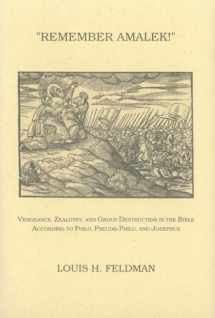
Remember Amalek!: Vengeance, Zealotry, and Group Destruction in the Bible according to Philo, Pseudo-Philo, and Josephus
ISBN-13:
9780878204632
ISBN-10:
0878204636
Author:
Louis H. Feldman
Publication date:
2004
Publisher:
Hebrew Union College Press
Format:
Paperback
288 pages
Category:
Christian Books & Bibles
FREE US shipping
Book details
ISBN-13:
9780878204632
ISBN-10:
0878204636
Author:
Louis H. Feldman
Publication date:
2004
Publisher:
Hebrew Union College Press
Format:
Paperback
288 pages
Category:
Christian Books & Bibles
Summary
Remember Amalek!: Vengeance, Zealotry, and Group Destruction in the Bible according to Philo, Pseudo-Philo, and Josephus (ISBN-13: 9780878204632 and ISBN-10: 0878204636), written by authors
Louis H. Feldman, was published by Hebrew Union College Press in 2004.
With an overall rating of 3.9 stars, it's a notable title among other
Christian Books & Bibles
books. You can easily purchase or rent Remember Amalek!: Vengeance, Zealotry, and Group Destruction in the Bible according to Philo, Pseudo-Philo, and Josephus (Paperback) from BooksRun,
along with many other new and used
Christian Books & Bibles
books
and textbooks.
And, if you're looking to sell your copy, our current buyback offer is $0.7.
Description
The divine command to exterminate Amalek--men, women, children, and even animals who have no free will--is what in contemporary terms has been called genocide. Louis Feldman explores how the earliest systematic commentators on the Bible--the Hellenistic Jewish philosopher Philo in his many essays on biblical themes; the mysterious, still unclassified Pseudo-Philo in his Biblical Antiquities; the premier Jewish historian and polymath Josephus in his Jewish Antiquities; and the Rabbis in the Mishnah, Talmud, and other literature-wrestled with the issues involved in this divine command, especially its provision that an entire people must be eternally punished for the misdeeds of their ancestors. Feldman contextualizes his study of Amalek by considering how these ancient commentators relate to other cases where God commands the destruction of whole groups of people: the flood, the destruction of Sodom and Gomorrah, the plague of the first-born Egyptians, and the command to annihilate the Canaanites. He also studies accounts of mass destruction where there was no specific divine commandment-the annihilation of the Hivites because one of them raped Dinah, the annihilation of the nations of Sihon and Og, the complete destruction of the inhabitants of Jericho, and the extermination of the priests of Nob-as well as the challening issue of why God justifies Phinehas's zealotry, which involved transgressing the law to kill a Jew and a non-Jew for their immorality. All of these biblical passages raise difficult questions and provide no simple answers. Feldman shows us how ancient commentators received and struggled with Amalek and other genocide passages: Psuedo-Philo had the fewest problems and is most insistent on interpreting the divine command literally, while Philo turned to allegory to resolve the tensions these passages raised with the principle that the innocent should not suffer for the sins of the guilty, and Josephus was concerned to counter the impression that Jews hate non-Jews. Feldman's study exposes the deep roots of biblical reception in contemporary political and moral issues.


We would LOVE it if you could help us and other readers by reviewing the book
Book review

Congratulations! We have received your book review.
{user}
{createdAt}
by {truncated_author}


